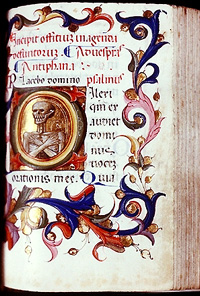
A post last month linked to the
Dante's Inferno Test, which caused one reader to write and ask,
Is it just Catholics that believe in purgatory? And if so, why? And if it is more commonly believed, what happened to being forgiven as long as you repent? Doesn't purgatory imply that for certain sins you are only 'partially' forgiven? And then, wouldn't that mean pretty much every one would pass through purgatory at some point?
Yes, the doctrine of purgatory is a uniquely Roman Catholic one. But as the entire church in the west was still part of that one catholic church at the time the doctrine of purgatory arose, it is worth wondering about together.
To get a Roman Catholic take on the doctrine, I went to the
New Advent Catholic Encycplopedia. The full article is
here, but it says in part
Purgatory (Lat., "purgare", to make clean, to purify) in accordance with Catholic teaching is a place or condition of temporal punishment for those who, departing this life in God's grace, are, not entirely free from venial faults, or have not fully paid the satisfaction due to their transgressions.
The Doctrine of Purgatory came from the Council of Florence in 1431, which was called to create some clear statements of the catholic faith in response to some early reformers (particularly the followers of Jan Hus, known as Hussites). That council would not have seen the Doctrine as a new creation, but a formulation of an already held belief.
For most later reformers, including Martin Luther and John Calvin, the rule of thumb for reforming the church was something to the effect of "If it is not in scripture, we won't do it." These church reformers with one voice (which was rare in the Reformation) denounced the doctrine of purgatory, leaving it out of Protestant churches.
But what of the Episcopal Church itself? The reformation which came to England with the break from Rome during Henry VIII's reign (creating in time the Anglican Communion of which King of Peace is a part) opened what they called the
via media or a middle path in which if a teaching or practice was contrary to scripture, it was dropped, but things found to be helpful, which were not contrary to scripture, could be retained. The official teaching of the Anglican Communion on purgatory is found in
the 39 articles, which are themselves still within our Book of Common Prayer in the
historical documents section (pages 867-876). Article XXII states,
The Romish Doctrine concerning Purgatory, Pardons, Worshipping and Adoration, as well of Images as of Relics, and also Invocation of Saints, is a fond thing, vainly invented, and grounded upon no warranty of Scripture, but rather repugnant to the Word of God.
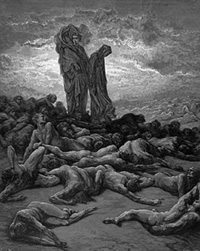
Having stated that it is not a generally Protestant doctrine, nor one uniquely retained by the Episcopal Church, it is probably still worth exploring where the idea comes from. Roman Catholic theologians would point to I Corinthians 3:11-15,
For no man can lay a foundation other than the one which is laid, which is Jesus Christ. Now if any man builds on the foundation with gold, silver, precious stones, wood, hay, straw, each man's work will become evident; for the day will show it because it is to be revealed with fire, and the fire itself will test the quality of each man's work. If any man's work which he has built on it remains, he will receive a reward. If any man's work is burned up, he will suffer loss; but he himself will be saved, yet so as through fire.
This passage speaks of a purifying fire through which one is saved.
Another relevant passage is I Thessalonians 4:13-18,
But we do not want you to be uninformed, brethren, about those who are asleep, so that you will not grieve as do the rest who have no hope. For if we believe that Jesus died and rose again, even so God will bring with Him those who have fallen asleep in Jesus. For this we say to you by the word of the Lord, that we who are alive and remain until the coming of the Lord, will not precede those who have fallen asleep. For the Lord Himself will descend from heaven with a shout, with the voice of the archangel and with the trumpet of God, and the dead in Christ will rise first. Then we who are alive and remain will be caught up together with them in the clouds to meet the Lord in the air, and so we shall always be with the Lord. Therefore comfort one another with these words.
This passage seems to refer to an intermediate state for those who have died and are awaiting judgment and so some Christians through the centuries wondered about that state and then combined it with the idea of purifying fire from the passage above in First Corinthians.
One more passage, which while not scriptural, was particularly relevant. Some books from the time between the Old and New Testaments were preserved as the Apocrypha. While they are not considered to be the inspired word of God and so authoritative for the church, these books are instructive of Jewish history and thought during the intertestemental period. In the Book of II Macabees, there is an incident which points toward a purgatory-like belief found in chapter 12:39-45,
And upon the day following, as the use had been, Judas and his company came to take up the bodies of them that were slain, and to bury them with their kinsmen in their fathers' graves. Now under the coats of every one that was slain they found things consecrated to the idols of the Jamnites, which is forbidden the Jews by the law. Then every man saw that this was the cause wherefore they were slain. All men therefore praising the Lord, the righteous Judge, who had opened the things that were hid, Betook themselves unto prayer, and besought him that the sin committed might wholly be put out of remembrance. Besides, that noble Judas exhorted the people to keep themselves from sin, forsomuch as they saw before their eyes the things that came to pass for the sins of those that were slain. And when he had made a gathering throughout the company to the sum of two thousand drachms of silver, he sent it to Jerusalem to offer a sin offering, doing therein very well and honestly, in that he was mindful of the resurrection: For if he had not hoped that they that were slain should have risen again, it had been superfluous and vain to pray for the dead. And also in that he perceived that there was great favour laid up for those that died godly, it was an holy and good thought. Whereupon he made a reconciliation for the dead, that they might be delivered from sin.
While not scriptural, this passage did lend credence to the idea that purgatory was not contrary to the Jewish faith from which Christianity was born.
With these passages in mind and the knowledge that we humans do not deserve the love God has shown us, the idea developed that as we wait for the judgment, God punishes us for lesser sins and purifies us for heaven. This idea found its fullest expression, not in the councils of the church, but in Dante's literary work,
The Divine Comedy.
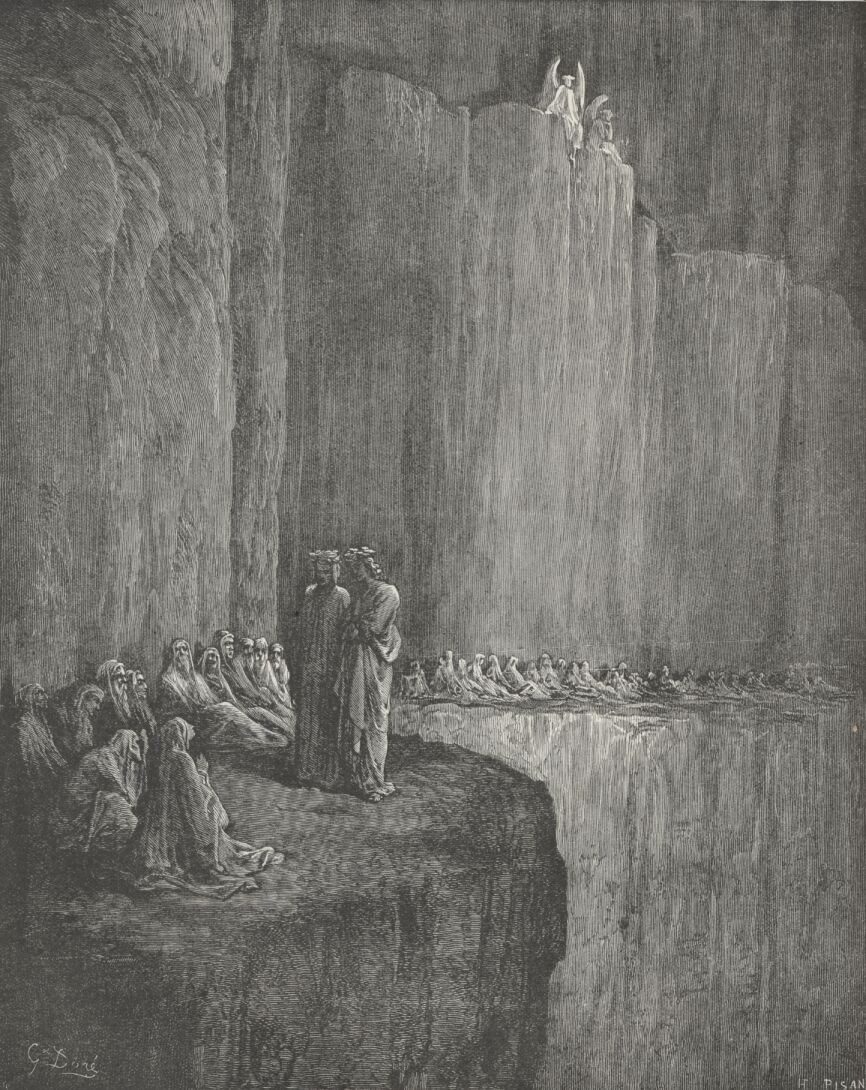
The Doctrine of Purgatory came about as Christians reflected on the fact that we humans are not perfect and generally do a poor job in attempting to live Christ-like lives. As we know God to be Holy, many wondered how it was that a Holy God could hang around with us unholy humans just because we had died. Purgatory filled in the gap and gave God a dynamic way to continue our purification after this life and before an eternity in heaven. The problem is that this, while connected to some scripture as noted above, went beyond not just the words of Christ, but the overwhelminging force of the bulk of scripture, which says that God's love is unearned, undeserved by humans and God loves us anyway. As Paul wrote to the Romans (5:8-10),
But God demonstrates His own love toward us, in that while we were yet sinners, Christ died for us. Much more then, having now been justified by His blood, we shall be saved from the wrath of God through Him. For if while we were enemies we were reconciled to God through the death of His Son, much more, having been reconciled, we shall be saved by His life.
So while it may seem too much to ask for to be truly forgiven of our sins by virtue of repentance and confession alone (rather than fiery purification), it is not more than Jesus promised us in scripture.
Closely connected to the concept of purgatory is the idea that we can pray for the dead. Certainly if one believes in purgatory, it is consistent to pray for those who are there. But what about the rest of us? If there is no purgatory, can and should we pray for the dead? I think the answer is yes. Those who we know and love who have died are no longer present to us, but they remain present to God and so it is not inappropriate to remember them before God. Not that we are praying them out of an intermediate state of punishment, but instead we trust them to the care of our loving God. This is what every funeral service does, turning over the care of someone we love to the God who made them and died to redeem them. So we can pray after the funeral, continuing to trust God to be with those we love, whether there is a purgatory or not.
peace,
Frank+
The Rev. Frank Logue, Pastor +
King of Peace Episcopal Church

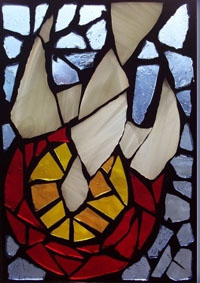

 Once, as I traveled through the Himalayas, there was a great forest fire. Everyone was frantically trying to fight the fire, but I noticed a group of men standing and looking up into a tree that was about to go up in flames. When I asked them what they were looking at, they pointed up at a nest full of young birds. Above it, the mother bird was circling wildly in the air and calling out warnings to her young ones. There was nothing she or we could do, and soon the flames started climbing up the branches.
Once, as I traveled through the Himalayas, there was a great forest fire. Everyone was frantically trying to fight the fire, but I noticed a group of men standing and looking up into a tree that was about to go up in flames. When I asked them what they were looking at, they pointed up at a nest full of young birds. Above it, the mother bird was circling wildly in the air and calling out warnings to her young ones. There was nothing she or we could do, and soon the flames started climbing up the branches.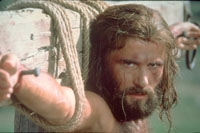 If her small heart was so full of love, how unfathomable must be the love of her Creator. That is the love that brought him down from heaven to become man. That is the love that made him suffer a painful death for our sake.
If her small heart was so full of love, how unfathomable must be the love of her Creator. That is the love that brought him down from heaven to become man. That is the love that made him suffer a painful death for our sake.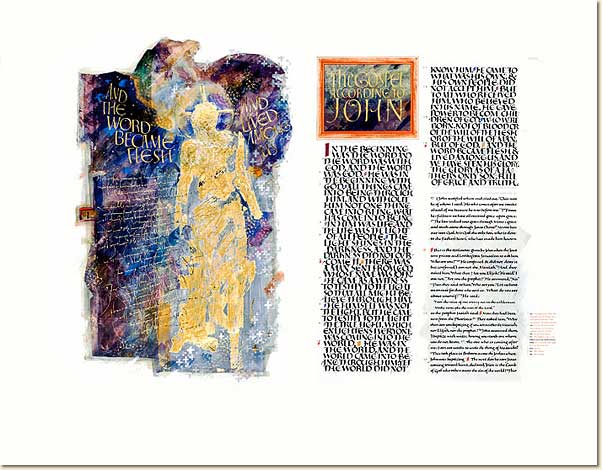
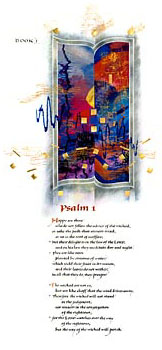 The Saint John's Bible is not completely alone. In a less broadly publicized (outside of Texas that is) effort and with no commission,
The Saint John's Bible is not completely alone. In a less broadly publicized (outside of Texas that is) effort and with no commission, 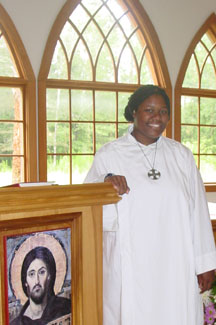 A sermon is not to give the preacher's words of wisdom, but God's Word in the preacher's words—the eternal and perfect coming through finite and a fallible human. It is a joy for me, as a preacher, to hear other preachers. I hear the familiar Word of God through someone else's life experience and the stories they have read and heard.
A sermon is not to give the preacher's words of wisdom, but God's Word in the preacher's words—the eternal and perfect coming through finite and a fallible human. It is a joy for me, as a preacher, to hear other preachers. I hear the familiar Word of God through someone else's life experience and the stories they have read and heard. 
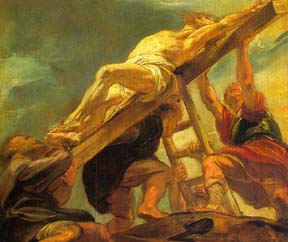 The context does not explain away the saying or take away the sting of the words. Jesus is clear that being his follower is demanding. He goes on to say,
The context does not explain away the saying or take away the sting of the words. Jesus is clear that being his follower is demanding. He goes on to say,




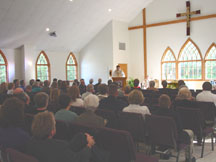 The contemporary Christian church is strong on programs and issues and short on the celebration of God's ministry in the world. We can either celebrate the work of God in the world—truly good news, or celebrate the work of the church in the world, truly work news. Modern-day Christian tend toward the latter, and it is killing us....The choice before us is always: Will we walk in the way of the gospel or the way of the world? If you decide for the way of the world, know this: you are in the company of much of the church, with its shrinking budgets, dwindling numbers, and dispirited attitude. If the gospel doesn't get your attention, maintenance will.
The contemporary Christian church is strong on programs and issues and short on the celebration of God's ministry in the world. We can either celebrate the work of God in the world—truly good news, or celebrate the work of the church in the world, truly work news. Modern-day Christian tend toward the latter, and it is killing us....The choice before us is always: Will we walk in the way of the gospel or the way of the world? If you decide for the way of the world, know this: you are in the company of much of the church, with its shrinking budgets, dwindling numbers, and dispirited attitude. If the gospel doesn't get your attention, maintenance will. That sounded like an affirmation of a mission mindset to me. I know that what he said is true. It is also truly a gift of God and not something we create and so I am all the more thankful. I am also aware that while God gifts us with the presence of the Holy Spirit, we can also quench that same spirit when we get focused on those already in the building, or even worse on the building itself. The temptation is always there.
That sounded like an affirmation of a mission mindset to me. I know that what he said is true. It is also truly a gift of God and not something we create and so I am all the more thankful. I am also aware that while God gifts us with the presence of the Holy Spirit, we can also quench that same spirit when we get focused on those already in the building, or even worse on the building itself. The temptation is always there.  religion, spirituality and the like, mainly, because very early in my life I found it a bad investment of time and words. Arguing is different from witnessing. Proclaiming is different from denouncing.
religion, spirituality and the like, mainly, because very early in my life I found it a bad investment of time and words. Arguing is different from witnessing. Proclaiming is different from denouncing. Awake in the morning and the first thing you do, thank God for it, even if you don't feel particularly happy about the day which is to come. 'This day which the Lord has made, let us rejoice and be grateful in it.' Once you have done this, give yourself time to realise the truth of what you are saying and really mean it—perhaps on the level of deep conviction and not of what one might call exhilaration. And then get up, wash, clean, do whatever else you have to do, and then come to God again. Come to God again with two convictions. The one is that you are God's own and the other is that this day is also God's own, it is absolutely new, absolutely fresh. It has never existed before. To speak in Russian terms, it is like a vast expanse of unspoiled snow. No one has trodden on it yet. It is all virgin and pure in front of you. And now, what comes next? What comes next is that you ask God to bless this day, that everything in it should be blessed and ruled by Him. After that you must take it seriously, because very often one says 'O God, bless me,' and having got the blessing we act like the prodigal son—we collect all our goods and go to a strange country to lead a riotous life.
Awake in the morning and the first thing you do, thank God for it, even if you don't feel particularly happy about the day which is to come. 'This day which the Lord has made, let us rejoice and be grateful in it.' Once you have done this, give yourself time to realise the truth of what you are saying and really mean it—perhaps on the level of deep conviction and not of what one might call exhilaration. And then get up, wash, clean, do whatever else you have to do, and then come to God again. Come to God again with two convictions. The one is that you are God's own and the other is that this day is also God's own, it is absolutely new, absolutely fresh. It has never existed before. To speak in Russian terms, it is like a vast expanse of unspoiled snow. No one has trodden on it yet. It is all virgin and pure in front of you. And now, what comes next? What comes next is that you ask God to bless this day, that everything in it should be blessed and ruled by Him. After that you must take it seriously, because very often one says 'O God, bless me,' and having got the blessing we act like the prodigal son—we collect all our goods and go to a strange country to lead a riotous life. A post last month linked to the
A post last month linked to the  Having stated that it is not a generally Protestant doctrine, nor one uniquely retained by the Episcopal Church, it is probably still worth exploring where the idea comes from. Roman Catholic theologians would point to I Corinthians 3:11-15,
Having stated that it is not a generally Protestant doctrine, nor one uniquely retained by the Episcopal Church, it is probably still worth exploring where the idea comes from. Roman Catholic theologians would point to I Corinthians 3:11-15, The Doctrine of Purgatory came about as Christians reflected on the fact that we humans are not perfect and generally do a poor job in attempting to live Christ-like lives. As we know God to be Holy, many wondered how it was that a Holy God could hang around with us unholy humans just because we had died. Purgatory filled in the gap and gave God a dynamic way to continue our purification after this life and before an eternity in heaven. The problem is that this, while connected to some scripture as noted above, went beyond not just the words of Christ, but the overwhelminging force of the bulk of scripture, which says that God's love is unearned, undeserved by humans and God loves us anyway. As Paul wrote to the Romans (5:8-10),
The Doctrine of Purgatory came about as Christians reflected on the fact that we humans are not perfect and generally do a poor job in attempting to live Christ-like lives. As we know God to be Holy, many wondered how it was that a Holy God could hang around with us unholy humans just because we had died. Purgatory filled in the gap and gave God a dynamic way to continue our purification after this life and before an eternity in heaven. The problem is that this, while connected to some scripture as noted above, went beyond not just the words of Christ, but the overwhelminging force of the bulk of scripture, which says that God's love is unearned, undeserved by humans and God loves us anyway. As Paul wrote to the Romans (5:8-10),
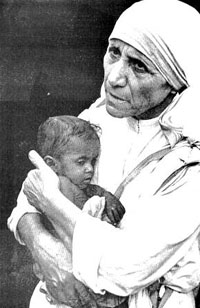 Mother Theresa called you today and said she is very short-staffed and desperately needs your help in India for two years. There is no pay, but she can provide a bed for you and simple meals with her staff. She explained that your primary responsibilities would be emptying bedpans and giving spoonfuls of water to the dying. What would you tell her? Why?
Mother Theresa called you today and said she is very short-staffed and desperately needs your help in India for two years. There is no pay, but she can provide a bed for you and simple meals with her staff. She explained that your primary responsibilities would be emptying bedpans and giving spoonfuls of water to the dying. What would you tell her? Why?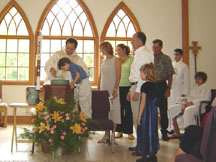



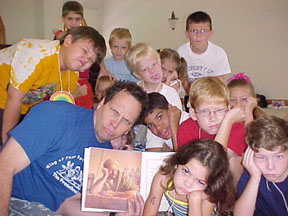
 The two stories for
The two stories for 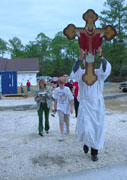 A sermon that draws this idea out more clearly was the last sermon preached when King of Peace met in the house on our current property. Following communion, but before concluding the worship, we prayed to secularize the house once more and processed out together to our current building. The sermon,
A sermon that draws this idea out more clearly was the last sermon preached when King of Peace met in the house on our current property. Following communion, but before concluding the worship, we prayed to secularize the house once more and processed out together to our current building. The sermon, 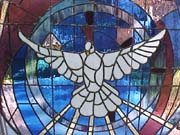 I considered myth more as defined in 2 or 3, meaning first and foremost that it is untrue. But if we consider Genesis from the standpoint of definition 1, then certainly it is an ancient story of ancestors that gives the worldview of a people. In fact we will share these stories with the children hoping they will grow up with a biblical worldview. We will teach the children that God made each of them and loves them very much, and today we will do that with the stories from Genesis. I guess that makes the stories myths, as they are ancient stories containing
I considered myth more as defined in 2 or 3, meaning first and foremost that it is untrue. But if we consider Genesis from the standpoint of definition 1, then certainly it is an ancient story of ancestors that gives the worldview of a people. In fact we will share these stories with the children hoping they will grow up with a biblical worldview. We will teach the children that God made each of them and loves them very much, and today we will do that with the stories from Genesis. I guess that makes the stories myths, as they are ancient stories containing 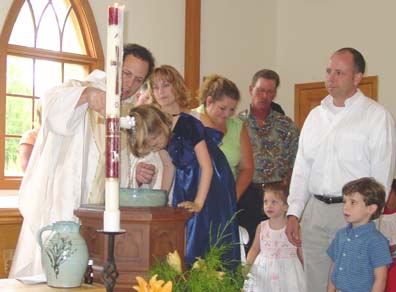
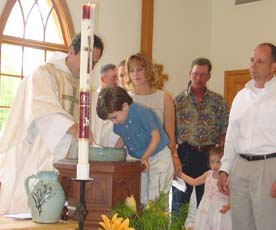 Today we welcomed into the household of God, Payton, Kali and Max. This week, all three newly baptized members of the Body of Christ will take part in our
Today we welcomed into the household of God, Payton, Kali and Max. This week, all three newly baptized members of the Body of Christ will take part in our 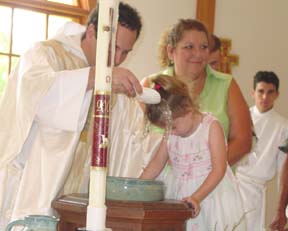 It was that well at which the baptisms today took place, for we do not baptize, God does. And in Jesus, God promised Payton, Kali and Max, a well springing up to eternal life.
It was that well at which the baptisms today took place, for we do not baptize, God does. And in Jesus, God promised Payton, Kali and Max, a well springing up to eternal life. 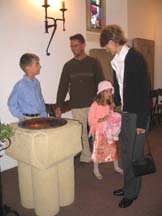
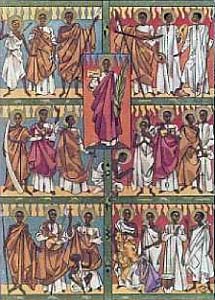 As
As 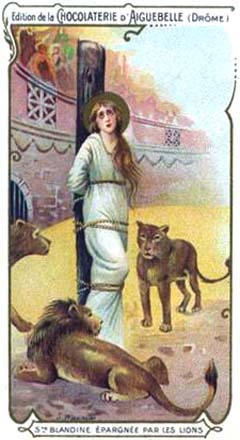 At first, Christians were excluded from the public baths, the market place, and from social and public life. They were subject to attack when they appeared in public, and many Christian homes were vandalized.
At first, Christians were excluded from the public baths, the market place, and from social and public life. They were subject to attack when they appeared in public, and many Christian homes were vandalized. 






0 Comments:
Post a Comment
<< Home